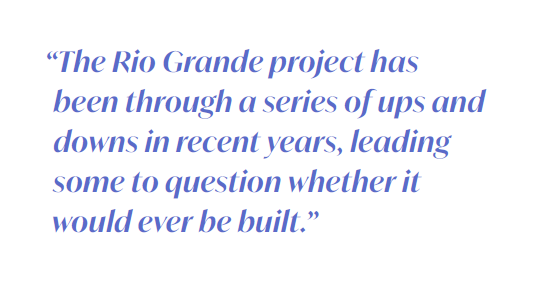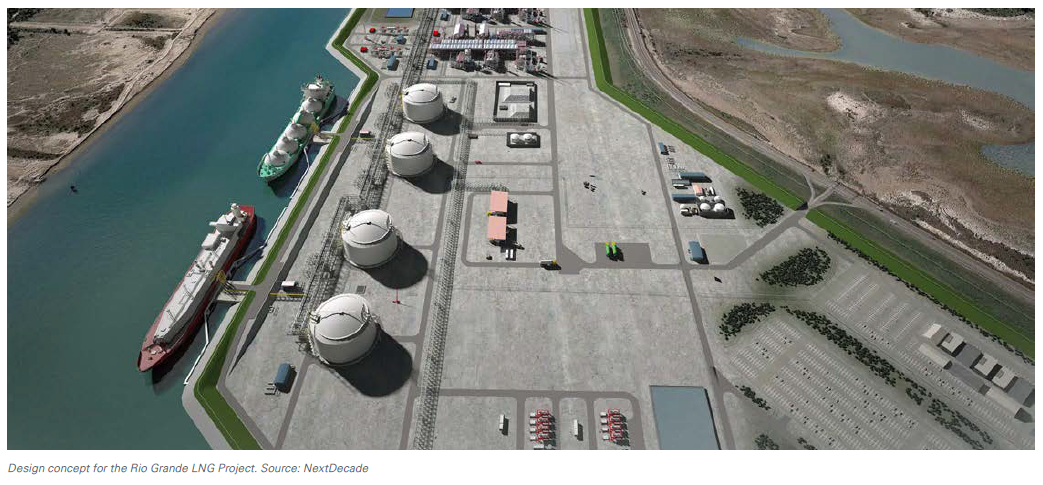TotalEnergies helps NextDecade reach FID on Rio Grande LNG [Gas in Transition]
US-based NextDecade and its partners have announced a long-awaited final investment decision (FID) on the first phase of the Rio Grande LNG export project in Brownsville, Texas. This is the third US LNG project to reach FID this year, following the first phase of Sempra’s Port Arthur LNG and the second phase of Venture Global LNG’s Plaquemines.
While this handful of FIDs shows how favourable market conditions are currently for the development of new LNG terminals, the Rio Grande project has been through a series of ups and downs in recent years, leading some to question whether it would ever be built. However, around a month before FID was reached, Rio Grande received a major boost with the entry of LNG heavyweight TotalEnergies into the project.
|
Advertisement: The National Gas Company of Trinidad and Tobago Limited (NGC) NGC’s HSSE strategy is reflective and supportive of the organisational vision to become a leader in the global energy business. |
The French company said on June 14 that it would acquire a 17.5% interest in NextDecade in a three-tranche transaction worth a combined $219mn. The first tranche, comprising a 5.06% interest, had just been acquired for $40mn when TotalEnergies made its announcement.
The deal would also give the French company a 16.7% interest in the first phase of Rio Grande and offtake of 5.4mn tonnes/year from this phase over a 20-year period. TotalEnergies’ commitment to Phase 1 is worth around $1.1bn in total according to NextDecade’s presentation on the FID.
“TotalEnergies was a critical component as they signed 0.7 bcf/d of Rio Grande’s capacity, accounting for a third of the total offtake capacity. Likewise, they acquired a $219 million interest in the project,” an Enverus Intelligence analyst, Josephine Mills, tells NGW. She adds that the deal was particularly critical following Societe Generale’s withdrawal of its financial commitments to Rio Grande.
“TotalEnergies’ investment provided security to the project,” she says.
Indeed, confirmation that Societe Generale had pulled out of Rio Grande last year – disclosed in March – was seen at the time as one of the reasons the project was running into more delays as NextDecade pursued an FID. The bank’s withdrawal was the latest in a series of setbacks over the course of several years, which also included challenges with securing offtakers.
Changing fortunes
The changing demand picture helped to turn around Rio Grande’s fortunes, however. Following the start of the war in Ukraine in February 2022, NextDecade announced a series of offtake agreements with a mix of Asian and European buyers, as well as with supermajor ExxonMobil.
Notably, one of the European companies lining up to buy volumes from Rio Grande was France’s Engie, which had previously pulled out of supply talks with NextDecade in 2020. Its withdrawal was attributed to concerns over the environmental impact of the shale gas that will serve as feedstock for Rio Grande. However, once war broke out in Ukraine, European energy security needs appeared to override these concerns, and Engie signed a 15-year sale and purchase agreement (SPA) for 1.75mn tonnes/year of LNG from the project in May 2022.
As well as bringing in TotalEnergies last month, NextDecade also struck a deal to include Global Infrastructure Partners (GIP) in the development of Rio Grande. Indeed, under the various framework agreements involved, GIP will be a majority investor in Phase 1 of the project, with a roughly $3.5bn commitment. This is in addition to a $750mn commitment from Singapore’s GIC and a $500mn commitment from Abu Dhabi’s Mubadala Investment.
NextDecade itself committed to invest around $283mn into Phase 1 of the project, including $125mn of pre-FID capital investments.
Costs
The first phase comprises Rio Grande’s first three liquefaction trains, with a combined capacity of 17.6mn t/yr. A subsequent phase would ultimately see the plant’s capacity increased to 27mn t/yr in total through the addition of two further trains. Of the first-phase capacity, 16.2mn tonnes/year is covered by long-term SPAs, or around 92%.

NextDecade noted that the $18.4bn project financing for Rio Grande Phase 1 represented the largest greenfield energy project financing in US history. The company touted this as evidence that natural gas and LNG would continue to play a “critical” role in the energy transition. However, it can also be seen as an illustration of cost pressures for LNG developers as other players on the US Gulf Coast also attempt to reach FID.
“The significant increase in the project cost due to continuous delays might act more as a deterrent for large-scale greenfield projects compounded with increasing construction and materials cost,” Mills says. “After NextDecade FID’d Rio Grande their stock dropped over $2 from ~$8.48 to $6.01 from July 12 to 13 due to worries of financing the $18.4bn project,” she adds.
Investment bank Morgan Stanley said in a note that it attributed much of the weakness to NextDecade’s low ownership level in the project and to updated cash flow projections, which had come in at $200-300mn net to NextDecade. This was below Morgan Stanley’s estimate of $305mn and prior guidance of $400-550mn, the bank noted.
Morgan Stanley also pointed to a roughly 5% increase in the cost of the engineering, procurement and construction (EPC) contract, which has been awarded to Bechtel, to $11.96bn from previous estimates of $11.4bn. The EPC cost now equates to $681/t, according to NextDecade.
Looking ahead
Cost inflation appears set to continue to be a cause for concern both for the Rio Grande partners and for other LNG developers trying to move towards FID. There are reasons for optimism as well, though, including predictions of rising LNG prices in the future.
“Today’s market conditions are not very indicative of future economics and we expect prices to increase going forward (~$5/mn Btu by 2026),” Mills says. The Henry Hub benchmark, to which most US LNG export volumes are indexed, was at below $2.70/mn Btu as of the final week of July.
“For now, ideally you want to hedge costs to the best of your ability,” Mills continues. “To mitigate rising inflation and secure resources some LNG companies are pre-ordering material, trying to increase the current number of workers and lengthening work schedules.”
However, there are also rising concerns about labour market shortages, which extend beyond the LNG industry and stand to be exacerbated by each large new project entering construction, including Rio Grande.

“Labour shortages could cause further delays to newly approved projects, particularly to any projects FID’d after Rio Grande as there have already been three large projects approved this year, which require thousands of construction workers each,” Mills says.
Nonetheless, developers are pushing ahead, both on the US Gulf Coast and elsewhere, including in Mexico, where various projects are also aiming to tap into abundant nearby sources of US shale gas for feedstock. These include the Saguaro Energia project, which Mills highlights as being among the most likely to also reach FID this year.
“The Delfin LNG project [offshore in the US Gulf of Mexico] and Saguaro LNG look like they have the highest probability for FID in 2023,” Mills says. “Delfin LNG’s first floating LNG vessel is 100% contracted. The project was originally expected to take FID in 2018 and since has received several one-year extensions. The last extension is until September 2023 to put the onshore part of the project into service,” she continues. “The offtake capacity for Saguaro trains 1 and 2 is 60% contracted and Mexico Pacific has received strong government support.”
NextDecade’s FID shows that even amid setbacks, there are ways to move forward, including by diluting ownership and bringing in new partners. The market reaction may not have been favourable, but Morgan Stanley nonetheless described the FID as a “positive step forward for the company”, adding that it viewed the sell-off of NextDecade shares as “overdone”. Time – and LNG price trends over the coming years – will tell whether the company’s strategy has paid off.




